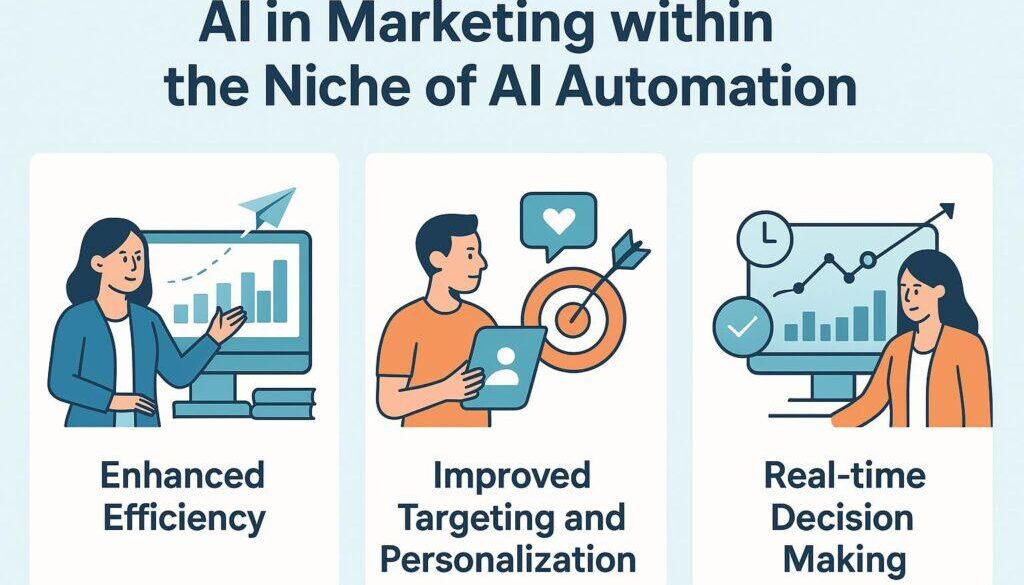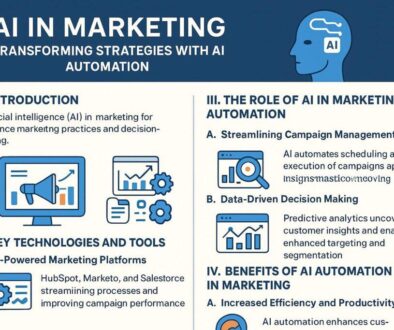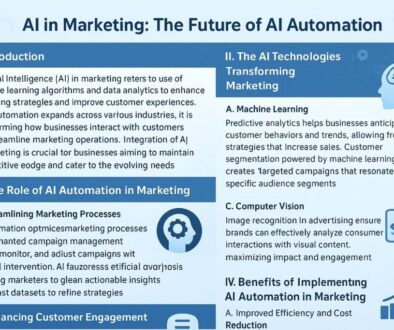Harnessing AI Automation for Enhanced Marketing Strategies: Benefits and Future Trends
AI in Marketing within the Niche of AI Automation
I. Introduction
Artificial Intelligence (AI) in marketing embodies the use of machine learning, analytics, and automated processes to enhance marketing strategies. AI automation, a subset of this field, enables businesses to optimize various marketing functions such as data analysis, customer engagement, and campaign management. The integration of AI into marketing strategies is crucial in today's competitive landscape, as it allows brands to make data-driven decisions and enhance customer experience.
II. Benefits of AI Automation in Marketing
A. Enhanced Efficiency
AI automation significantly boosts operational efficiency by streamlining workflow processes across marketing teams. It minimizes the need for manual tasks, allowing employees to focus on more strategic initiatives. Automated systems can handle repetitive functions, which leads to reduced errors and faster execution of marketing strategies.
B. Improved Targeting and Personalization
One of the standout benefits of AI in marketing is its ability to analyze vast amounts of customer data. By identifying patterns and preferences, businesses can create tailored marketing campaigns that resonate with their audience. Personalization not only improves customer satisfaction but also increases conversion rates through more relevant messaging.
C. Real-time Decision Making
AI provides marketers with the ability to make real-time decisions based on instant data analysis. This capability allows companies to adapt their marketing strategies on-the-fly, responding to customer behavior and market changes quickly. Enhanced agility ultimately leads to a more responsive marketing approach, which can improve outcomes and ROI.
III. Key AI Technologies Used in Marketing Automation
A. Machine Learning
Machine learning plays a pivotal role in marketing by enabling predictive analytics and customer behavior modeling. This technology helps companies anticipate trends and understand customer preferences, leading to more effective marketing campaigns. By leveraging machine learning, brands can optimize their advertising efforts to meet customer needs proactively.
B. Natural Language Processing (NLP)
Natural Language Processing (NLP) is instrumental in enhancing customer interactions through chatbots and virtual assistants. These AI-driven tools streamline customer service, allowing for immediate responses and support. Additionally, sentiment analysis aids in understanding customer opinions, enabling marketers to refine their strategies based on feedback and emotions.
C. Computer Vision
Computer vision technology significantly impacts advertising through image recognition and visual content analytics. Brands can analyze visual data to ensure advertisements resonate with target audiences and enhance visual engagement. By optimizing the use of graphics and imagery, businesses can improve brand awareness and recall.
IV. Real-world Applications of AI in Marketing Automation
A. Email Marketing Automation
AI automation has transformed email marketing, allowing for precise segmentation and targeting of audiences. This technology enables A/B testing and optimization of campaigns, ensuring that messages align with customer preferences. As a result, marketers can improve open and conversion rates through tailor-made email content.
B. Social Media Marketing
In the realm of social media marketing, AI facilitates automated content scheduling and posting, ensuring consistent engagement. AI also assists in influencer identification, helping businesses connect with the right voices to amplify their reach. This level of automation allows brands to focus on strategy and creativity.
C. Customer Relationship Management (CRM)
Chatbots have become a cornerstone of customer service in CRM systems, providing immediate assistance to inquiries. Leveraging AI for customer insights helps businesses understand purchasing behavior and loyalty patterns. These tools enhance the overall customer journey, leading to improved retention rates.
V. Challenges and Considerations
A. Data Privacy and Security
As businesses integrate AI into their marketing strategies, issues surrounding data privacy and security arise. Compliance with regulations like GDPR is essential to maintain customer trust. Marketers must also consider the ethical implications of AI usage to ensure transparency and foster positive customer relationships.
B. Integration with Existing Systems
Integrating AI technologies with existing marketing systems can be challenging, especially when dealing with legacy systems. Ensuring compatibility while minimizing disruption requires careful planning and execution. Moreover, user training and adoption are crucial for maximizing the potential of AI tools.
C. Dependence on Technology
While automation enhances efficiency, there is a risk of over-reliance on technology at the expense of the human touch. A balance must be struck between automation and personal interaction to ensure meaningful customer connections. Marketers need to remain vigilant about maintaining the essence of brand humanity in their automated strategies.
VI. Future Trends of AI in Marketing Automation
A. The rise of hyper-personalization
The future of AI in marketing automation is leaning towards hyper-personalization, where experiences are tailored to individual preferences in real time. This trend can lead to significantly higher engagement rates and customer satisfaction.
B. Increased use of predictive analytics
As data becomes even more accessible, predictive analytics will play a crucial role in forecasting customer behaviors and market trends. Companies that harness this form of AI can stay ahead of the curve and make informed marketing decisions.
C. Evolution of voice search and conversational marketing
The rise of voice search technology is prompting a shift toward conversational marketing. Brands that adapt their strategies to incorporate voice search optimization will find new ways to reach and engage their audiences.
D. Integration of augmented reality and AI
Augmented reality combined with AI can provide immersive customer experiences. This trend offers unique opportunities for brands to innovate their marketing strategies and create interactive engagements that captivate consumers.
VII. Conclusion
AI is redefining the marketing landscape, providing unprecedented capabilities for automation and data analysis. Businesses that leverage AI in their marketing strategies stand to gain a competitive advantage, ensuring better customer engagement and optimized campaign performance. Marketers should prioritize the adoption of AI technologies to harness their full potential and prepare for the future of marketing automation.



